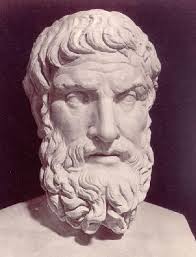More People of Greece
More Topic Categories
Related Destinations
Epicurus (04/02/-341 - 270 BC)
 Epicurus was an Ancient Greek philosopher, who created his own School, called Epicureanism, one of the best known schools of Greek philosophy.
Epicurus was an Ancient Greek philosopher, who created his own School, called Epicureanism, one of the best known schools of Greek philosophy.He was born in 341 BC in the island of Samos and he was an Athenian citizen. Still a child, Epicurus got acquainted with the philosophical though of Nausiphanes who lived in the nearby island Teos; as a result, he was closer to Democritus’ theories, rather than any Platonic way of thinking. When he was 18, he went to Athens in order to serve his military duties at the same time as the comedic playwright Menandrus. Not much is known for the next 15 years of his life.
Later, he created his own philosophical circle in Mytilene and Lampsacus. He returned to Athens when he was 34 years old, where he bought an estate to house his philosophical school, the Garden of Epicurus. He taught for 35 years, leading a quiet and simple life. All members of the school, men, women, courtesans and slaves, had an equal contribution. Epicurus died in 270 BC, aged 72.
During the Hellenistic era, i.e. the period starting with the death of Alexander the Great (323 BC) and ends with the naval battle in Aktio (31 BC), Epicureanism played a central role in philosophy, along with the schools of Stoics, Aristotelians, Skeptics, Cynics etc. Epicurus’ theory revolves around the moral character of philosophy. The main goal is to study the reasons of human misery and the wrong beliefs that cause it, e.g. superstition, so as to understand how to live pleasantly. According to Epicurus, a pleasant life can be achieved with the absence of pain and fear and by leading a self-sufficient life surrounded by friends. He also said that pleasure and pain are the measure by which we should decide what to prefer and what to avoid. Pleasure is morally acceptable and should be pursued, as long as it ensures that we obtain inner peace. If this is achieved through pain as well, then pain also becomes a positive force. Therefore, choosing among pleasures is no longer a matter of quantity, but quality.
Moreover, Epicurus discerned between two types of pleasure, katastematic and kinetic. Concerning kinetic pleasure, the person feels discomfort until they achieve it. Katastematic ones are much more powerful. For example, satisfying the sense of hunger is a kinetic pleasure. However, the sense of calmness after someone is no longer hungry is a katastematic pleasure. Therefore, if someone eats too much, they will have achieved the kinetic pleasure of satisfying their hunger, but not the katastematic pleasure of calmness, and they will be miserable.
The Epicurean philosophy has influenced various movements throughout history. Thinkers of the French Revolution, as well as people such as John Locke, were hugely inspired by these teachings. Thomas Jefferson, considering himself an Epicurean, said that “all men are created equal” and have rights, such as “life, liberty and the pursuit of happiness”.
See Also:
 Athens Photos
Athens Photos
 Santorini Photos
Santorini Photos
 Crete Photos
Crete Photos
 Meteora Photos
Meteora Photos
 Corfu Photos
Corfu Photos




